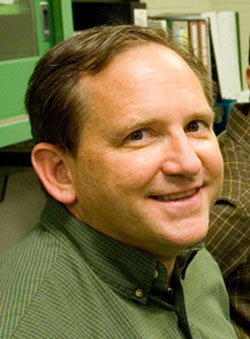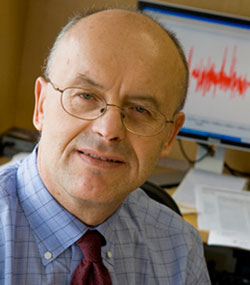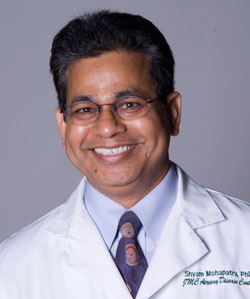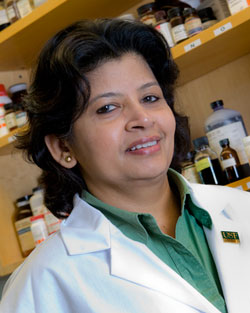USF Health awarded $3.1 M in Florida biomedical grants
Research ranges from novel nanotechnology for cancer detection and therapy to ethics of clinical trials
Tampa, FL (Dec. 21, 2009) — Four USF Health researchers received more than $3.1 million in Florida Department of Health grants to support research for tobacco-related diseases, including cancer and cardiovascular disease.
The awards, beginning Jan. 1, 2010, are from the state’s James and Esther King Biomedical Research Program and the Bankhead-Coley Cancer Research Program. The USF recipients were among 35 Florida scientists competitively selected from among 66 grant proposals that were highly ranked by the National Institute of Health Challenge Grant (RC1) competition, but did not get funded.
The principal investigators and their projects are:

• Eric Bennett, PhD, Department of Molecular Pharmacology and Physiology
Regulated and Aberrant Glycosylation Modulate Cardiac Excitability, $713,117, two-year James and Esther King grant. Dr. Bennett will investigate processes involved in regulating the heart’s electrical system that could lead to new therapies for diseases such as congenital disorders of glycosylation, diabetes, cardiac arrhythmias and heart failure.

• Benjamin Djulbegovic, ScD, MD, Department of Internal Medicine
When Are Clinical Trials Ethical for Both Future and Study Patients? $595,410, two-year Bankhead-Coley grant. Ethicists and physicians often disagree whether clinical trials benefit the volunteers currently enrolled in the trial as well future patients (society). Dr. Djulbegovic will search for the common ground by identifying those situations where clinical trial participation serves both trial and future patients equally well.

• Shyam Mohapatra, PhD, Department of Internal Medicine (Division of Allergy and Immunology) and USF Nanomedicine Research Center:
– 4-D Live Cell Imaging System, $499,994, one-year James and Esther King shared instrument grant. With this new computerized imaging system, combining a sophisticated microscope and ultrasensitive camera, scientists can look inside cells and better identify which proteins and enzymes are produced. The shared instrument will allow several College of Medicine laboratories to advance their drug development research more rapidly. The co-applicants for this project include Robert Deschenes, PhD, Department of Molecular Medicine; Bruce Lindsey, PhD, Department of Molecular Pharmacology and Physiology; and Santo Nicosia, Department of Pathology and Cell Biology.
– Targeted Gene Therapy by SNAP Delivery Method for Treatment of Lung Cancer, $710,792, two-year Bankhead-Coley grant. Dr. Mohapatra is investigating a new treatment for lung cancer that uses nanoparticle-mediated gene therapy delivered by a cell-based delivery system to treat metastatic lung cancers. The exceedingly small particles may double as powerful diagnosis and treatment vehicles – by carrying emitting agents that enhance MRI imaging and more accurately detect and track disease, as well as therapeutic genes to destroy the cancer once it is targeted. Subhra Mohapatra, PhD, is a co-principal investigator.

• Subhra Mohapatra, PhD, Department of Molecular Medicine
Nanohole Sensor-Based Detection Technology for Cutaneous Metastatic Melanoma, $621,696, two-year Bankhead-Coley Program grant. Using metastatic melanoma as a model, Dr. Mohapatra will develop an ultrasensitive sensor that could identify a highly specific combination of biomarkers for earlier detection of cancers. The study will evaluate technology that detects the presence and concentration of pathogens or disease antigens in the blood and lymph by monitoring how a polarized laser beam interacts with a gold-coated surface perforated with evenly-spaced nanoholes. The technology integrates a tiny chamber, which allows fluid containing the sample to flow over the gold surface and has the potential to detect multiple protein-protein interactions simultaneously. Dr. Mohapatra will collaborate with Dale Larson of Draper Laboratory and scientists from the Draper Bioengineering Center at USF.
More than $19.5 million in new Biomedical Research Grants were awarded by the state. The larger than usual number of awards was made possible by the Florida Legislature’s recent decision to dedicate up to $50 million of the state tobacco user fee increase to the James & Esther King Biomedical Research Program and the Bankhead-Coley Cancer Research Program in 2009-10.
For the full list of funded grants, visit http://www.floridabiomed.com/news/newsdetail120409.html
– USF Health –
USF Health is dedicated to creating a model of health care based on understanding the full spectrum of health. It includes the University of South Florida’s colleges of medicine, nursing, and public health; the schools of biomedical sciences as well as physical therapy & rehabilitation sciences; and the USF Physicians Group. With more than $380.3 million in research grants and contracts last year, USF is one of the nation’s top 63 public research universities and one of 39 community-engaged, four-year public universities designated by the Carnegie Foundation for the Advancement of Teaching. For more information, visit www.health.usf.edu

